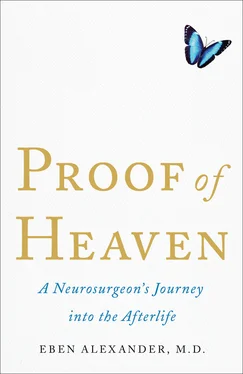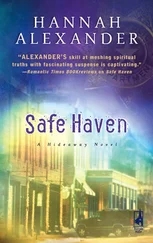Though tried isn’t really the right word. Crisp and clear, the memories were right there, right where I had left them.
There are two ways to be fooled. One is to believe what isn’t true; the other is to refuse to believe what is true.
—SØREN KIERKEGAARD (1813–1855)
In all this writing, one word seemed to come up again and again.
Real .
Never, before my coma, had I realized just how deceptive a word can be. The way I had been taught to think about it, both in medical school and in that school of common sense called life, is that something is either real (a car accident, a football game, a sandwich on the table in front of you) or it’s not. In my years as a neurosurgeon, I’d seen plenty of people undergo hallucinations. I thought I knew just how terrifying unreal phenomena could be to those experiencing them. And during my few days of ICU psychosis, I’d had a chance to sample some impressively realistic nightmares as well. But once they passed, I quickly recognized those nightmares for the delusions they were: neuronal phantasmagoria stirred up by brain circuitry struggling to get running again.
But while I was in coma my brain hadn’t been working improperly. It hadn’t been working at all. The part of my brain that years of medical school had taught me was responsible for creating the world I lived and moved in and for taking the raw data that came in through my senses and fashioning it into a meaningful universe: that part of my brain was down, and out. And yet despite all of this, I had been alive, and aware, truly aware, in a universe characterized above all by love, consciousness, and reality. (There was that word again.) There was, for me, simply no arguing this fact. I knew it so completely that I ached.
What I’d experienced was more real than the house I sat in, more real than the logs burning in the fireplace. Yet there was no room for that reality in the medically trained scientific worldview that I’d spent years acquiring.
How was I going to create room for both of these realities to coexist?
Finally the day came when I had written down everything I could, every last memory of the Realm of the Earthworm’s-Eye View, the Gateway, and the Core.
Then it was time to read. I plunged into the ocean of NDE literature—an ocean into which I’d never so much as dipped a toe before. It didn’t take me long to realize that countless other people had experienced the things I had, both in recent years and centuries past. NDEs are not all the same, each one is unique—but the same elements show up again and again, and many I recognized from my own experience. Narratives of passing through a dark tunnel or valley into a bright and vivid landscape—ultra-real—were as old as ancient Greece and Egypt. Angelic beings—sometimes winged, sometimes not—went back, at least, to the ancient Near East—as did the belief that such beings were guardians who watched the activities of people on earth and greeted those people when they left it behind. The sense of being able to see in all directions simultaneously; the sensation of being above linear time—of being above everything , essentially, that I had previously thought of as defining the landscape of human life; the hearing of anthem-like music, which entered through one’s whole being rather than simply one’s ears; the direct and instantaneous reception of concepts that normally would have taken a very long time and a great deal of study to comprehend, without any struggle whatsoever… feeling the intensity of unconditional love.
Over and over, in the modern NDE accounts and in spiritual writings from earlier times, I’d feel the narrator struggling with the limitations of earthly language, trying to get the entirety of the fish they had hooked on board the boat of human language and ideas… and always, to one degree or another, failing.
And yet, with each attempt that fell frustratingly short of its goal, each person straining at language and ideas to get this enormity across to the reader, I’d understand the aim of the storyteller and what they’d hoped to convey in all of its boundaryless majesty, but simply couldn’t.
Yes, yes, yes! I’d say to myself as I read. I understand .
These books, this material, had all, of course, been there before my experience. But I’d never looked at it. Not just in terms of reading, but in another way as well. Quite simply, I’d never held myself open to the idea that there might be anything genuine to the idea that something of us survives the death of the body. I was the quintessential good-natured, albeit skeptical, doctor. And as such, I can tell you that most skeptics aren’t really skeptics at all. To be truly skeptical, one must actually examine something, and take it seriously. And I, like many doctors, had never taken the time to explore NDEs. I had simply “known” they were impossible.
I also went through the medical records of my time in coma—a time that was meticulously recorded, practically from the very start. Reviewing my scans just as I would have for a patient of my own, it became clear to me at last just how fantastically sick I had been.
Bacterial meningitis is unique among diseases in the manner in which it attacks the outer surface of the brain while leaving its deeper structures intact. The bacteria efficiently wreck the human part of our brain first, and finally prove fatal by attacking the deeper “housekeeping” structures common to other animals, deep beneath the human part. The other conditions that can damage the neocortex and cause unconsciousness—head trauma, stroke, brain hemorrhages or brain tumors—are not nearly as efficient at completely damaging the entire surface of the neocortex. These tend to involve only part of the neocortex, leaving other parts unscathed and able to function. Not only that, but instead of taking the neocortex alone out, they tend to also damage the deeper and more primitive parts of the brain as well. Given all of this, bacterial meningitis is arguably the best disease one could find if one were seeking to mimic human death without actually bringing it about. (Though of course, it usually does. The sad truth is that virtually everyone as sick as I was from bacterial meningitis never returns to tell the tale.) (See Appendix A.)
Though the experience is as old as history, “the near-death experience” (regardless of whether it was seen as something real or a baseless fantasy) only became a household term fairly recently. In the 1960s, new techniques were developed that allowed doctors to resuscitate patients who had suffered a cardiac arrest. Patients who in former times simply would have died were now pulled back into the land of the living. Unbeknownst to them, these physicians were, through their rescue efforts, producing a breed of trans-earthly voyagers: people who had glimpsed beyond the veil and returned to tell about it. Today they number in the millions. Then, in 1975, a medical student named Raymond Moody published a book called Life After Life, in which he described the experience of a man named George Ritchie. Ritchie had “died” as a result of cardiac arrest as a complication of pneumonia and been out of his body for nine minutes. He traveled down a tunnel, visited heavenly and hellish regions, met a being of light that he identified as Jesus, and experienced feelings of peace and well-being that were so intense he had difficulty putting them into words. The era of the modern near-death experience was born.
I couldn’t claim complete ignorance of Moody’s book, but I had certainly never read it. I didn’t need to, because I knew, first of all, that the idea that cardiac arrest represented some kind of close-to-death condition was nonsense. Much of the literature about near-death experiences concerns patients whose hearts stopped for a few minutes—usually after an accident or on the operating table. The idea that cardiac arrest constitutes death is outdated by about fifty years. Many laypeople still believe that if someone comes back from cardiac arrest, then they have “died” and returned to life, but the medical community long ago revised its definitions of death to center on the brain, not the heart (ever since brain death criteria, which rely on crucial findings of the patient’s neurological examination, were established in 1968). Cardiac arrest is relevant to death only in terms of its effect on the brain. Within seconds of cardiac arrest, cessation of blood flow to the brain leads to widespread disruption of cooperative neural activity and loss of consciousness.
Читать дальше












